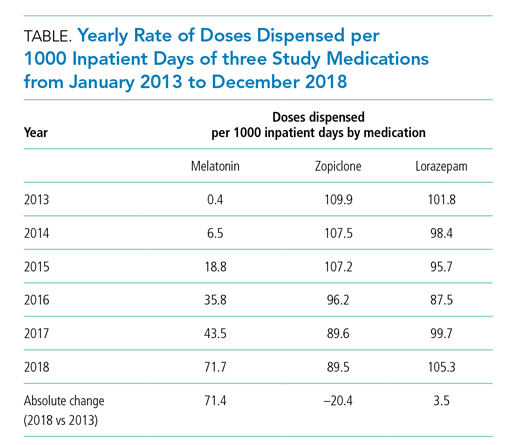Melatonin is increasingly used to treat insomnia, although evidence for its efficacy and safety is lacking
Melatonin is increasingly used to treat insomnia, although evidence for its efficacy and safety is lacking
I said it twice for a reason. You will note in the sentence what I think you know but write off due to, eh-hem, factose intolerance. Dosing placebos is never pretty.
We are stuck with folks who cannot sleep at night. Benzos are out. Z-drugs are out. Antihistamines are definitely out. So, what are we supposed to do?
Follow the pack and write for a benign substance, of course, and tell the patient, “I have just the thing for you.”
But we are all in this together, and this JHM study hit home.
Melatonin Increasingly Used in Hospitalized Patients
Our neighbors to the north also share our enthusiasm for the magic pill. Also, note the take-home table below:
(Zopiclone is used up in Canada–a “z-drug” like Ambien)

*This suggests that melatonin is not simply being substituted for higher-risk sleep medications and is instead being given to patients who might not have received sleep medications otherwise.
CONCLUSION
In this 6-year study of sleep medication use at two academic hospitals, we found that overall use of melatonin, zopiclone, and lorazepam increased by 25%, predominantly because of markedly increased melatonin use. Given the current lack of high-quality evidence, further research on the use of melatonin in hospitalized patients is needed.
I do not doubt if you looked at your institution’s melatonin use from 2010-20, you would find similar increases. If there were evidence to back up this increase, I would be sympathetic to the cause. However, given virtually nothing substantive has been published, what can we conclude? Either we are not keeping up with what the evidence says (for inpatient insomnia, at least), or more concerning, we are using an ineffective pill under a pretext of efficacy and sending the wrong message to patients. It seems, given time constraints, lack of treatment options, and minimal “harms” and cost, we reach for the friendliest option. Clinically justified from a provider POV but ethically ambiguous if we do not communicate our intent. See HERE.
What to do? For this prevalent hospital issue, I do not have an answer until big pharma (or big warm milk) manufactures the pill we need.



The use of Melatonin and its effects are clearly written in this Blog. Very good information on sleeping pills in the hospitalized patients. Keep sharing the Blogs like this.